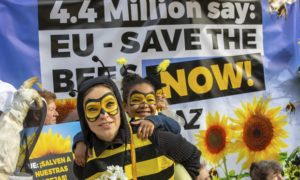
People protest ahead of the historic EU vote on a full neonicotinoids ban at Place Schuman in Brussels, Belgium.
Credit: Olivier Matthys/AP
The European Union will ban the world’s most widely used insecticides from all fields due to the serious danger they pose to bees.
The ban on neonicotinoids, approved by member nations on Friday, is expected to come into force by the end of 2018 and will mean they can only be used in closed greenhouses.
Bees and other insects are vital for global food production as they pollinate three-quarters of all crops. The plummeting numbers of pollinators in recent years has been blamed, in part, on the widespread use of pesticides. The EU banned the use of neonicotinoids on flowering crops that attract bees, such as oil seed rape, in 2013.
But in February, a major report from the European Union’s scientific risk assessors (Efsa) concluded that the high risk to both honeybees and wild bees resulted from any outdoor use, because the pesticides contaminate soil […]









People who don’t garden have little idea how prevalent this lack of pollinators and song birds is. Last year I became a beekeeper, with one top bar hive, since even though I live one km from a major apiarist, they did not come to ‘fix’ my plants as they once did. This winter with it being so damp through Jan & Feb, the bees succumbed to mould, a common problem. Humans have changed the chemistry of the planet, so much so, that now we are now included in the 6th mass extinction probability. Not a certainty, as little in life is.
What is even better news is that our bee population–which, it turns out, was never in serious trouble to begin with–has recovered completely without any ban on neonicotinoids. I have no complaints about eliminating chemicals from our environment–we have way too many. But it turns out the media, having been alarmist on the issue, have not surprisingly ignored the really good news on the bee front. http://www.slate.com/articles/health_and_science/science/2016/07/colony_collapse_disorder_is_no_longer_the_existential_threat_to_honeybees.html
The piece in Slate is 2 years old (2106). Here is what the USDA says in midway through June 2017:
“Pollinators are a vital part of agricultural production. In the United States, more than one-third of all crop production – 90 crops ranging from nuts to berries to flowering vegetables – requires insect pollination. Managed honey bee colonies are our primary pollinators, adding at least $15 billion a year by increasing yields and helping to ensure superior-quality harvests.
However, our beekeepers have been steadily losing colonies. The number of honey bee hives in this country has decreased from 6 million in the 1940s to about 2.5 million today.” https://www.usda.gov/media/blog/2017/06/20/being-serious-about-saving-bees
— S
I have observed that many with a conservative pov seem to disagree that anything is amiss regarding the environment. Usually they seem to feel that any environmental problem is the fault of the liberal tree huggers that hate progress and want to increase taxes and government regulations. I don’t understand why this is so.